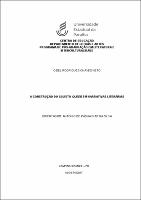| Compartilhamento |


|
Use este identificador para citar ou linkar para este item:
http://tede.bc.uepb.edu.br/jspui/handle/tede/3277Registro completo de metadados
| Campo DC | Valor | Idioma |
|---|---|---|
| dc.creator | Chaves Neto, Oziel Rodrigues | - |
| dc.contributor.advisor1 | Silva, Antonio de Pádua Dias da | - |
| dc.date.accessioned | 2019-04-01T12:42:44Z | - |
| dc.date.issued | 2017-10-05 | - |
| dc.identifier.citation | Chaves Neto, Oziel Rodrigues. A construção do sujeito Queer em narrativas literárias. 2017. 101f. Dissertação( Programa de Pós-Graduação em Literatura e Interculturalidade - PPGLI) - Universidade Estadual da Paraíba, Campina Grande, 2017. | por |
| dc.identifier.uri | http://tede.bc.uepb.edu.br/jspui/handle/tede/3277 | - |
| dc.description.resumo | O objetivo desta pesquisa é investigar os modos pelos quais autores modernos construíram suas personagens e quais suas relações com os postulados da teoria queer. O problema surgiu ao tomarmos conhecimento de uma coleção chamada A fantástica literatura queer, e notarmos que suas narrativas fugiam das políticas não indentitárias da teoria supracitada, direcionando seus contos para uma perspectiva LGBT. Portanto, decidimos investigar como os escritores desta coleção enxergaram o queer na construção de suas narrativas/personagens. A hipótese levantada é de que a coleção que se rotula queer, tomando por base a teoria que se tornou muito popular nos últimos anos, na verdade restringe-se a uma temática LGBT. Propusemos também, em textos literários fora da coletânea, analisar sob um ponto de vista queer, em enredos que precedem a invenção da teoria, como obras de autores como Oswald de Andrade e Virginia Woolf se comportam diante de tal perspectiva. Portanto, acreditamos que nosso trabalho repercutirá no modo como o escritor/leitor contemporâneo encararia o queer em textos literários. Para isso fundamentamos nossa pesquisa em Judith Blutler (2002; 2003; 2013), pensadora que escreveu o livro considerado um dos marcos iniciais dos estudos queer: Gender Trouble (1990); Richard Miskolci (2015), autoridade da teoria no Brasil; Beatriz Preciado (2010; 2014), que escreveu o inovador Manifesto Contrassexual e a noção de multidões queer; Jacques Derrida (2008), com seu conceito chave de desconstrução, entre outros autores. Esperamos com isso observar como escritores contemporâneos veem o queer e como obras anteriores à teoria se comportam diante de sua contemporaneidade. Concluímos o trabalho encontrando visões diversas acerca do queer, no tocante aos textos que analisamos, e uma infinidade de direcionamentos que os estudos da teoria poderiam projetar para o futuro. | por |
| dc.description.abstract | The purpose of this research is to investigate the ways in which modern authors have constructed their characters and their relationships with the postulates of queer theory. The problem arose when we became aware of a collection called A Fantástica Literatura Queer, and noted that its narratives ran away from the non-identity politics of the aforementioned theory, directing their tales to an LGBT perspective. Therefore, we decided to investigate how the writers of this collection saw the queer in the construction of their narratives/characters. The hypothesis raised is that the collection that is labeled queer, based on the theory that has become very popular in recent years, is in fact confined to an LGBT theme. We have also proposed, in literary texts outside the collection, to analyze from a queer point of view, in scenarios that precede the invention of theory, as works by authors like Oswald de Andrade and Virginia Woolf behave in the face of such a perspective. Therefore, we believe that our work will have repercussions on how the contemporary writer / reader would approach queer in literary texts. For this we base our research on Judith Blutler (2002, 2003, 2013), a thinker who wrote the book considered one of the initial milestones of queer studies: Gender Trouble (1990); Richard Miskolci (2015), authority of theory in Brazil; Beatriz Preciado (2010; 2014), who wrote the groundbreaking Contrassexual Manifesto and the notion of queer crowds; Jacques Derrida (2008), with its key concept of deconstruction, among other authors. We hope to observe how contemporary writers see Queer and how works prior to theory behave in the face of their contemporaneity. We conclude the work by finding different views about the queer in the texts we have analyzed, and a myriad of directions that theory studies could project for the future. | eng |
| dc.description.provenance | Submitted by Ricardo Carrasco (ricardogc84@uepb.edu.br) on 2018-07-24T17:45:18Z No. of bitstreams: 1 PDF - Oziel Rodrigues Chaves Neto.pdf: 1047223 bytes, checksum: 355cb95c8a48c1efbc483b3e77ba40cc (MD5) | eng |
| dc.description.provenance | Approved for entry into archive by Luciana Medeiros (luciana@uepb.edu.br) on 2019-04-01T12:42:44Z (GMT) No. of bitstreams: 1 PDF - Oziel Rodrigues Chaves Neto.pdf: 1047223 bytes, checksum: 355cb95c8a48c1efbc483b3e77ba40cc (MD5) | eng |
| dc.description.provenance | Made available in DSpace on 2019-04-01T12:42:44Z (GMT). No. of bitstreams: 1 PDF - Oziel Rodrigues Chaves Neto.pdf: 1047223 bytes, checksum: 355cb95c8a48c1efbc483b3e77ba40cc (MD5) Previous issue date: 2017-10-05 | eng |
| dc.format | application/pdf | * |
| dc.thumbnail.url | http://tede.bc.uepb.edu.br/jspui/retrieve/7969/PDF%20-%20Oziel%20Rodrigues%20Chaves%20Neto.pdf.jpg | * |
| dc.language | por | por |
| dc.publisher | Universidade Estadual da Paraíba | por |
| dc.publisher.department | Pró-Reitoria de Pós-Graduação e Pesquisa - PRPGP | por |
| dc.publisher.country | Brasil | por |
| dc.publisher.initials | UEPB | por |
| dc.publisher.program | Programa de Pós-Graduação em Literatura e Interculturalidade - PPGLI | por |
| dc.rights | Acesso Aberto | por |
| dc.subject | 1. Teoria Queer. 2. Literatura fantástica. 3. Abjeção. 4. Diversidade | por |
| dc.subject.cnpq | CIENCIAS SOCIAIS APLICADAS | por |
| dc.title | A construção do sujeito Queer em narrativas literárias | por |
| dc.type | Dissertação | por |
| Aparece nas coleções: | PPGLI - Dissertações | |
Arquivos associados a este item:
| Arquivo | Descrição | Tamanho | Formato | |
|---|---|---|---|---|
| PDF - Oziel Rodrigues Chaves Neto.pdf | 1.02 MB | Adobe PDF |  Baixar/Abrir Pré-Visualizar |
Os itens no repositório estão protegidos por copyright, com todos os direitos reservados, salvo quando é indicado o contrário.




